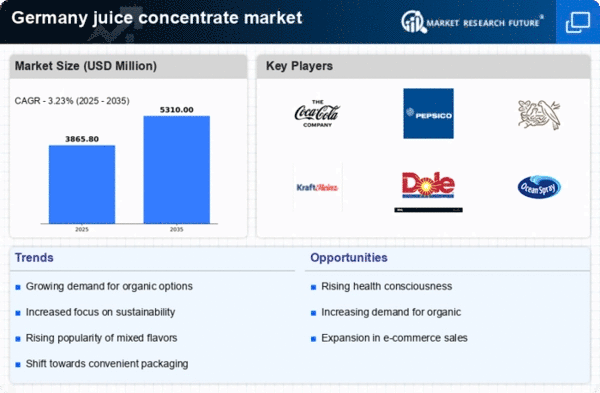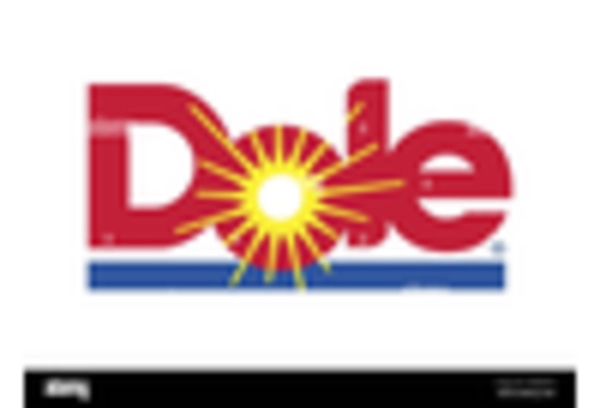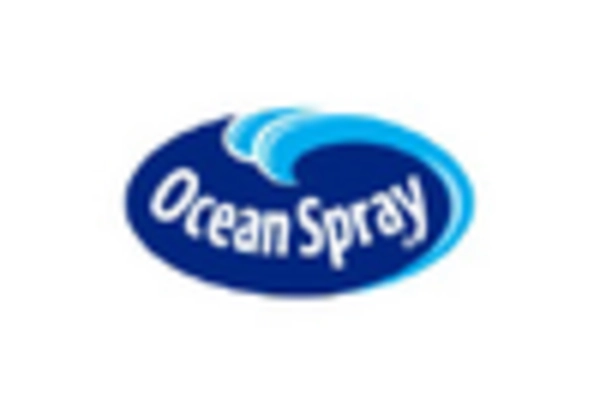Growth of On-the-Go Consumption
The fast-paced lifestyle of consumers in Germany contributes to the growth of on-the-go consumption, significantly impacting the juice concentrate market. As busy individuals seek convenient and portable beverage options, juice concentrates are increasingly favored for their ease of use and versatility. In 2025, it is estimated that ready-to-drink juice products will account for over 30% of the total juice concentrate market. This shift indicates a potential for innovation in packaging and product formats, allowing manufacturers to cater to the evolving preferences of consumers. The juice concentrate market industry is likely to capitalize on this trend by developing single-serve options and multi-pack offerings.
Emergence of Functional Beverages
The juice concentrate market in Germany is experiencing the emergence of functional beverages, which combine health benefits with traditional juice products. Consumers are increasingly drawn to beverages that offer additional advantages, such as enhanced hydration, energy boosts, or digestive support. This trend is likely to drive innovation within the juice concentrate market industry, as manufacturers explore new formulations and ingredient combinations. In 2025, the market for functional juice concentrates is expected to grow by 18%, indicating a robust opportunity for brands to differentiate themselves and cater to the evolving preferences of health-oriented consumers.
Expansion of Distribution Channels
The juice concentrate market in Germany is benefiting from the expansion of distribution channels, which enhances product accessibility. Retailers are increasingly diversifying their offerings, with supermarkets, health food stores, and online platforms playing pivotal roles in reaching consumers. In 2025, e-commerce is projected to account for approximately 25% of juice concentrate sales, reflecting a shift in shopping habits. This trend indicates that the juice concentrate market industry must adapt to the evolving retail landscape by optimizing supply chains and leveraging digital platforms to engage consumers effectively.
Increased Focus on Nutritional Value
The juice concentrate market in Germany is witnessing a heightened focus on nutritional value, driven by consumer awareness regarding health benefits. As individuals become more informed about dietary choices, there is a growing preference for juice concentrates that offer added vitamins, minerals, and functional benefits. In 2025, products fortified with nutrients are expected to capture a larger share of the market, potentially increasing by 20%. This trend encourages manufacturers within the juice concentrate market industry to innovate and enhance their product formulations, ensuring they meet the nutritional demands of health-conscious consumers.
Rising Demand for Natural Ingredients
The juice concentrate market in Germany experiences a notable increase in demand for natural ingredients. Consumers are increasingly seeking products that are free from artificial additives and preservatives. This trend aligns with a broader shift towards health-conscious consumption, where natural and organic products are preferred. In 2025, the market for organic juice concentrates is projected to grow by approximately 15%, reflecting a significant consumer preference for authenticity in food and beverage choices. The juice concentrate market industry is adapting to this demand by sourcing high-quality, natural ingredients, which enhances product appeal and market competitiveness.
















